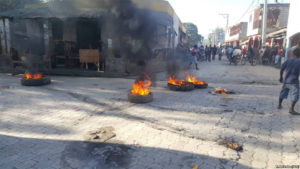Political turmoil in Haiti is not new, but its effects are now being felt in Fond Doux. College student Emile Maceus has returned to Fond Doux and is unable to attend classes. One professor keeps in touch via WhatsApp. Medical student Dieuseul Istache is not attending classes in person, but the students of his class are receiving instruction via the internet. College student Faédra Olivier has also not been able to attend classes in Ti Goave. Universities are closed.
“The current political paralysis and growing unrest in Haiti has shut down schools, hospitals, transportation, businesses and other services throughout the country, sending prices skyrocketing and raising the prospect of an imminent humanitarian disaster, Catholic Relief Services (CRS) warned today.”2
When work stops, people are not able to buy food even if available. Because 60% of the people earn less than $2 a day and about 25% receive about $1 a day, much of the country is in a perilous food situation.
The demonstrations are aimed at ousting the President Jovenel Moise, who took over in February 2017 during a turbulent election year following the resignation of Michel Martelly. A probe by the Haitian Senate in November 2017 resulted in charges of Jovenel Moise’s participation in corruption with his predecessor Martelly. Moïse, who owned a company named in the investigation, has denied all corruption allegations. He urges dialogue and says he will not resign. Political demonstrations caused the resignation of the Prime Minister in February; now they are aimed at the President.
The strength of the protests seems not so much to stem from the charges of corruption, however, but from rampant inflation — the high cost of gasoline and rising food cost.
To illustrate, Schneider Saint Surin of Fond Doux got his motorcycle in August of 2018. He purchased gasoline for 45$ht (45 Haitian dollars) a gallon. During the February protests (also partly about high gasoline costs), he paid 120$ht and now he is paying 200$ht — thus going from $2.50 a gallon to $6.67 to $11.11 per gallon. The result is a staggering blow to the economy. The results for the nation’s poor are catastrophic.
Pastor Brucely, said that the markets are open in the mornings, for 2-3 hours, but then close as the disruptors come about and start blocking roads. “The fuel availability/cost is the biggest driver of the unrest; if only they could resolve this, it would help tremendously. Cost of goods has basically doubled.”
Nurse Gernite Bonhomme said, “Food is hard to get and each day it takes more money to buy (something) than it did yesterday. There is no fuel … There is no school. People are getting killed. Many doctors that come from Port-au-Prince cannot come because of the situation, so people are not getting good care and some die before they get to the hospital. The situation is terrible.”
2 Nikki Gamer Catholic Relief Services — Report from Catholic Relief Services, October 17, 2019

